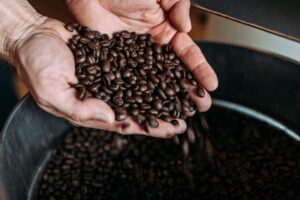This article directly addresses Gia Lai specialty coffee and the role of Vietnamese coffee factories. Understanding these elements is crucial for anyone interested in high-quality coffee from Vietnam.

1. Gia Lai: A Key Origin for Vietnamese Specialty Coffee
Gia Lai in Vietnam’s Central Highlands offers unique natural conditions ideal for coffee cultivation. This “terroir” produces coffee beans with distinct characteristics:
- Fertile Basaltic Soil: Mineral-rich red basaltic soil provides a strong foundation for healthy coffee plants, including Vietnam’s famous Robusta and high-quality Arabica varieties.
- Ideal Climate: The combination of altitude, temperature, and rainfall allows coffee cherries to ripen slowly, developing complex flavors essential for Gia Lai specialty coffee.
- Dedicated Cultivation: A growing number of farmers in Gia Lai employ sustainable practices and selective harvesting (hand-picking ripe cherries). These are key factors in meeting specialty coffee standards.
2. Coffee Factories’ Critical Role in Specialty Processing
From the farm, green coffee beans undergo transformation at coffee processing factories. Modern Vietnamese coffee factories are vital in elevating specialty coffee:
- Meticulous Processing:
- Washed Process: Beans are de-pulped, fermented, and washed. This method typically yields clean, bright flavors and clear acidity.
- Natural Process: Whole coffee cherries are sun-dried. This method results in bold, sweet, and fruity flavors.
- Honey Process: A hybrid method, retaining some mucilage during drying, creating a balance of sweetness and cleanliness.
- Professional factories strictly control each step to ensure quality and maximize the bean’s inherent flavor potential.
- Strict Quality Control: At the factory, beans are sorted and graded to remove defects and impurities. This process ensures lot consistency and high quality, meeting the stringent requirements for specialty coffee.
- Technology and Innovation: Many Vietnamese coffee factories invest in modern technology, from automated processing machines to humidity and temperature control systems. This optimizes processes and enhances product quality, allowing Vietnamese coffee to compete in the international specialty coffee market.
- Farmer Collaboration: Factories often work closely with farmers, providing knowledge and technical support to ensure beans are grown and harvested to standard, creating a sustainable value chain from farm to factory.
The Future of Vietnamese Specialty Coffee
The growth of Gia Lai specialty coffee and the increasing importance of Vietnamese coffee factories mark a new chapter for Vietnam’s coffee industry. This proves Vietnam is not only a powerhouse in volume but also a producer of unique and high-quality coffee beans.
Understanding this journey helps appreciate each cup of coffee and recognizes the continuous efforts from Gia Lai and Vietnamese factories to deliver the best coffee experience.
